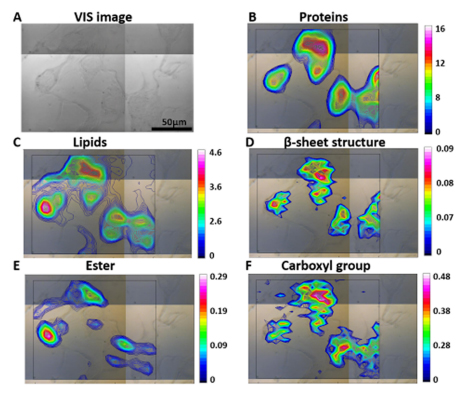ALBA Synchrotron

Led by researcher Tanja Ducic, beamline scientist from the MIRAS beamline at the ALBA Synchrotron, the live-cells study has revealed variations in the organic compounds of different glioblastoma cells and it confirms the efficacy of the riluzole drug against this type of cancer.

Figure 1: A live-cells setup for a synchrotron light FTIR evaluation of metabolic compounds and drug treatment in single intact cells is presented.
Glioblastoma is the most aggressive and deadly brain cancer in adults, with a life expectancy of only 15 months after its diagnosis.
Standard treatment, which has limited efficacy, includes surgery and concomitant radiochemotherapy. However, the molecular heterogeneity that characterizes the glioblastoma multiforme tumor (GBM) hinders the development of new therapies and more effective medical treatments.
An international research team, led by the ALBA Synchrotron scientist Tanja Ducic, has analyzed the differences in bio-macromolecular compounds of three different GBM cell lines to develop future treatments that target cancer cells more specifically. The study has also explored the effects of riluzole, considered a potential drug to treat glioblastoma, on these three types of GBM cells. The results have been published in the scientific journal Analytical Chemistry.

The cover page of the Analytical Chemistry journal visualized the content of the article by Tijana Tripkovic. https://pubs.acs.org/toc/ancham/94/4
Imaging differences and transformations in glioblastoma cells
The experiment performed at the and the SISSI beamline at Elettra Synchrotron has allowed the characterization of the composition of the different cell lines. It has been proved that each type of GBM cell presents differences in its organic compounds, a distinction that may allow the development of new and more specific treatment approaches.
On the other hand, treatment of the different GBM lines with riluzole has shown to change their cellular composition, affecting carbohydrate metabolism and the structure of DNA and lipids. It has also been observed that this drug causes transformations in protein conformation and may lead to epigenetic changes. The results indicate that riluzole seems to contribute to the malfunctioning of cancer cells.
This project also included long-term collaboration with the Faculty of Medicine of the University of Göttingen (Germany) and the Elettra synchrotron (Italy).